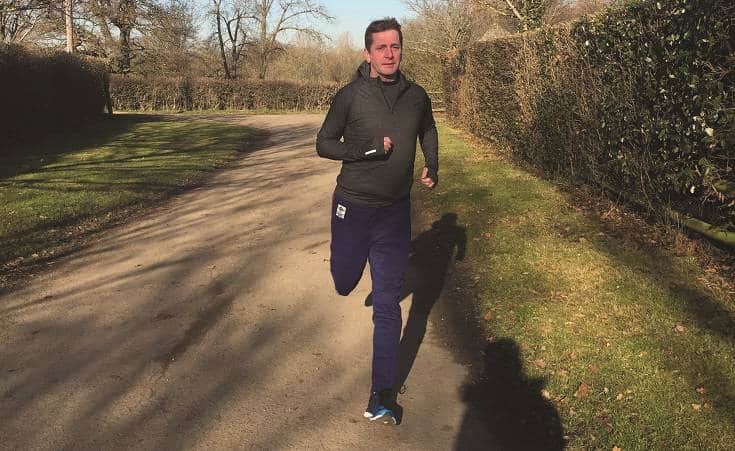ONE man who will be taking part in next month’s Tunbridge Wells Half Marathon knows all about the long road to recovery.
Zak Moore, 53, was attending his regular yoga class on June 18, 2015 when he suffered an attack of bacterial meningitis. He returned home, fell into a deep sleep, and his daughter found him the next afternoon.
Adult meningitis is rare but affects some 3,400 people in the UK every year. Around 10 per cent of cases are fatal. Lasting effects can include brain damage, loss of limbs, hearing or sight.
It causes the membrane surrounding the brain to swell, increasing pressure inside the skull. In Zak’s case it led to intra-cranial bleeding and septicaemia.
He was taken into intensive care and placed in an induced coma for two weeks to allow his brain time to recover.
Within 10 months Zak was competing in the Brighton Marathon, even though he had not been running for 25 years.
He has also written a book about his experience, entitled Comarathon Man. The comeback trail has been tough but it is an inspiring story.
Next month he takes part in the Tunbridge Wells Harriers’ Half Marathon as a warm-up for another crack at the full distance down on the south coast.
“I was unconscious for two weeks in the coma. After I woke up, even taking the four steps to the toilet was very, very scary,” he says.
“They jacked me up with some fancy drugs and the two larger toes on my left foot went numb. I couldn’t get the balance right and I was knackered all down my left side.
“I lost hearing in my left ear until the swelling in my brain went down after six months and I could wear a hearing aid.”
Born in Ayrshire, Zak is an IT expert who has lived in Tonbridge since 1998. His wife, Clare, is a nurse and they have three children.

- SUPPORTIVE Zak Moore with his wife Clare and children Ryan and Caitlin
Caitlin, now 18, was the daughter who found him after his attack – and to whom he dedicates his book, ‘for saving my life’.
“I used to run a lot when I was in the Territorial Army in the Eighties,” he says. “Then I did nothing for 25 years.
“In hospital I had to hold on to the therapist’s arm to walk 100 yards and I would be very tired.
“Then we got up to 400 yards by the end of July, walking like a Thunderbird puppet who was being controlled by a speed freak.”
Having left hospital after two months, he embarked on a 10-week course with a personal trainer, Emma McMahon, from the gym at Tonbridge School.
He had managed to walk twice around the running track there when he saw an advert for the Brighton Marathon in a newspaper and pledged to take part.
Emma was left in a state of disbelief, but his family was supportive. “My wife said ‘Once you set yourself a goal, you’ll do it’. Plus it got me out of the house.”
‘Running helped me get back to normal. I’m 100 per cent’
He went from running with the dog to doing repeats up and down hill and eventually slogging 18 miles in one go. He says ‘the running has made me feel 20 years younger’.
It also helped with his neurological state. “I could actually see the decision-making process in my head. It would take about 30 seconds for the facts to come back from my brain.
“When I remembered something it was like a forest growing in my head. Then I had a layer of emotion growing on top of that. The running helped me get back to normal. I’m 100 per cent now.”
Zak raised £1,000 for Meningitis Research Foundation when he ran on their behalf in his first marathon last year. All donations from readers of his free book will go to the same charity.
He is planning another book now: “When I was writing, there was a business book bubbling away inside. It’s about taking concepts from music and using them to synthesise new ways of working.”
One piece of feedback about the book which really made an impact on Zak was a message he received from a Matron at King’s College Hospital in London, Clair-Louise Harris.
“Clair was given a copy of the book by a researcher,” he says. “She told me that it helped her with her reflective practice when she was treating patients.”
Zak’s experiences are likely to prove an inspiration to many more people. His story has got legs and it will run and run.
To read the book or donate to Meningitis Research Foundation, visit comarathonman.com. To enter the race on February 19, visit www.twharriers.org.uk or www.race-nation.com
Tribute from Clair-Louise Harris, Matron at King’s College Hospital, London
Zak has given me both inspiration and insight
Clair-Louise Harris, Clinical Research Matron for Anaesthetics, Critical Care, Emergency Medicine and Trauma at King’s College Hospital in London, wrote to the Times with a tribute to Zak Moore
“Zak is very inspirational, and that was my main impression of his book. I was so impressed at the insightful and mindful way he approached his recovery, which must have been extremely challenging. There is no doubt that his determination has played a huge role in his achievements.
As a critical care nurse Zak’s account of his experience in the acute stages served as an important reminder of how alien the environment and practices in an intensive care unit are, particularly for patients who may be confused, and this is obviously a very frightening situation to be in.
Frequent reassurance, explanation and orientation of the patient is so important. Zak wrote in a very humourous way and it was very funny how he said that hospital staff are obsessed with what day of the week it is!
But this brought home how the assessment of the patients’ orientation regarding time may be assessed more creatively. Constant interrogation about the day of the week may be intimidating, especially if patients are feeling scared.
Obviously such a personal account also serves as a reminder that each patient is an individual with unique circumstances and challenges and that a serious event such as this is a crisis for the whole family.
In critical care nursing we aim to support the patient and their loved ones and I hope Zak’s family felt the team were sensitive to the gravity of the situation for them.
My role is as lead for the Critical Care and ED research service and so I was very pleased that Zak found participation in a research study a positive experience.
It is our aim to offer the opportunity to as many patients as possible to take part in research, if they wish, as part of the everyday NHS care so it is encouraging when research is accepted in this way.
This will go towards improving the evidence for doctors treating patients in future. Particulary interesting observations from a clinical research perspective were how Zak’s self-assessment of function differed from that of his wife Clare.
It’s interesting to bear in mind because occasionally if a patient is unable to complete the follow-up assessments, we may ask family for their assessment. But clearly this may differ from how the patient is feeling.
Another important observation from the research perspective is how Zak’s experience with some of the psychological tests, for example drawing a clock made him feel stupid.
We will be very mindful of this as a research team – that the perception of ‘failing’ a test may be very disheartening.”
Three weeks to go:
Work out what fuel to put in your tank
The third in our series of training tips for those wanting to run the Tunbridge Wells Half Marathon
EATING the right things in the run-up to and during the Tunbridge Wells Half Marathon can make all the difference to how well you perform on the day – and how much you enjoy your race.
Getting your nutrition right for race day is something that you need to practise in order to find out what works best for you.
“Some runners can eat a big breakfast and then run 30 minutes later, others can’t run for hours after eating,” explains Jane Dew, a fitness instructor at Nuffield Health Fitness and Wellbeing Gym on Knights Park Leisure Park and a run leader for Runtogether.
“You don’t want to be doubled up on race day, so make sure that do your experimenting on your long runs, ideally mirroring race day,” advises Jane.
“The Half Marathon beings at 9am, so try and start your training run then and eat breakfast at the time that you intend to on race day. See if that suits you or if you need to adapt your plans.”
Although sugar has had a very bad press recently, it is not the enemy when it comes to endurance sports.
Jane says: “There is discussion about the effectiveness of fat as an energy source, but on sports nutrition workshops I’ve been to, the belief is that carbs provide the fuel needed for endurance athletes.
“The carbohydrates get glycogen to your muscles, which creates energy when you are in an aerobic state to keep you going.”
Your fuel for the race starts the night – or even a couple of days – before. “People talk about carb-loading, but that is not the same as calorie-loading,” cautions Jane.
“You should eat roughly the same sized meal, just increase the carbs on the plate and reduce the rest. If you calorie-load, you are likely to feel heavy and sluggish during the race.”
During the race, how you refuel is very much a personal choice. Most runners need some carbs, but some get around on a handful of jelly babies or a few sips of a sports drink, while others need something more substantial, like energy gels or bars.
“You should experiment during your training runs to find out what works for you and don’t be tempted to change your routine on race day. If it works in training it will work on the day,” says Jane.
“You must stay hydrated all through the race. Take a drink at every water station, even if it’s a few sips, or carry a drink with you.
“Even mild dehydration will affect your performance to a degree. The more you sweat, the more you need to drink.”
Jane adds: “If you are not sure about race nutrition, see a personal trainer, such as those at Nuffield Health and other gyms.
“They can advise you on what to eat and drink to make sure you have a great race.”








